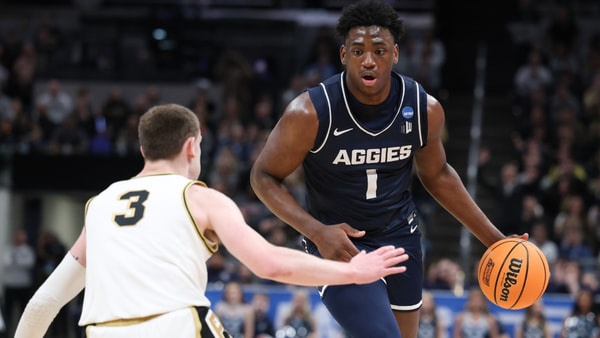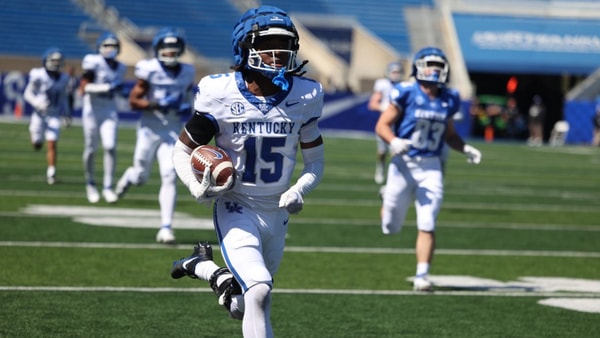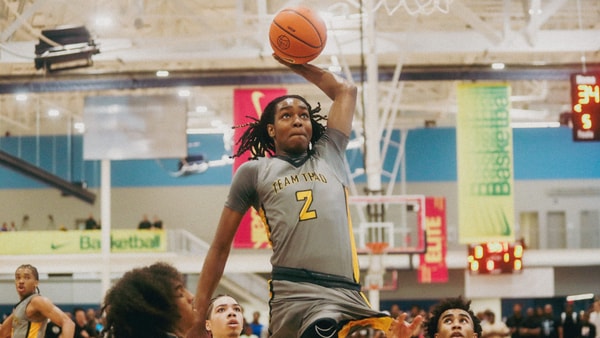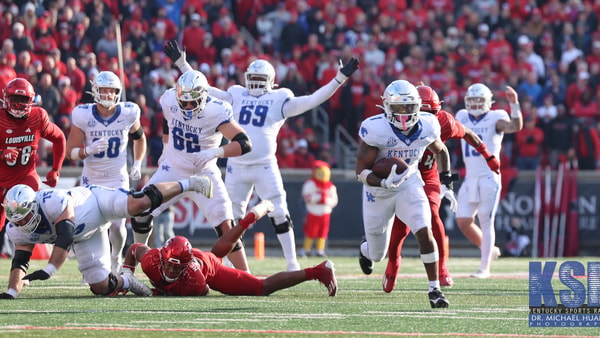Does the SEC Tournament matter? A breakdown.
Coming off yet another early exit in the SEC Tournament, one of the hottest topics amongst Big Blue Nation isn’t about Kentucky’s style of play, the quality of the players, or even Calipari’s insistence on not starting his best players. Okay, that last one is actually a pretty spicy point of discussion. However, the ultimate line drawn in the sand comes on the subject of how much the SEC Tournament matters, if at all.
There are two firmly entrenched sides to this debate. Let’s call them the John Calipari side and the Drew Franklin side. Team Calipari is adamant that the SEC Tournament is only beneficial when it comes to NCAA Tournament seeding. Nothing else. Moreover, he feels it only helps seeding around the margins with Sunday’s championship game having no bearing whatsoever on the final bracket.
On the other side of the argument, Drew Franklin stands with a drink in hand on the third level of Tootsie’s amongst a sea of Kentucky fans who have been looking forward to basking in basketball and Broadway all season long, asking Calipari, “How does this not matter?”
So, let’s take a look at each side, and use some math and science to determine which camp is right, and which one is entirely misguided.
History cuts both ways
One of the strongest arguments when it comes to minimizing the importance of the SEC Tournament is history. Kentucky lost in the SEC Tournament two out of the last three times they went on to win the National Championship.
In 2012, Vanderbilt took down Anthony Davis, Michael Kidd-Gilchrist, and company and that team went on to win every game of the Big Dance convincingly to hang banner number eight in Rupp. How upset are you today about that Vandy loss, if you even remember it?
Similarly, Mississippi State knocked the Wildcats out of the 1996 SEC Tourney, only for them to run the table in the NCAA Tournament and win the National Title. I’m guessing you don’t lose too much sleep over that SEC tournament loss to the Bulldogs as you dream about Tony Delk while wearing that oversized National Champions t-shirt.
The point is that when you compare the two tournaments, everyone everywhere would agree the NCAA matters significantly more than any conference tournament. That being said, a poor performance in the conference tournament often spells doom for NCAA.
According to Kentucky stat guru Corey Price, 2018-2019 is the only season since 1991-1992 that Kentucky advanced to at least the Elite Eight of the NCAA Tournament without advancing to the championship game of the SEC Tournament. On top of that, Kentucky has never made it past the Sweet 16 in a year where they lost their first game of the SEC Tournament.
So, while it is very possible to win a National Title without winning the Conference Tournament, history also shows an early exit does not bode well for a deep NCAA run.
How much do conference tournaments affect seeding?
Quad 1 records. Quad 3 losses. Bracketology. Net ratings. It all gets confusing. If Calipari is right and the SEC is a nuisance exercise used primarily to throw fans some crumbs, and seeding is the only meaningful takeaway for the teams, to what degree are seeds moving?
The answer is not much.
The first updated bracket Joe Lundardi put out after Kentucky lost to Texas A&M featured Kentucky as the No. 10 overall team, squarely on the 3-seed line. This was their exact place on his last bracket prediction, playing in the Midwest region.
Having said that, Lundardi has since dropped the ‘Cats to a 4-seed thanks to other teams taking their conference tournament more seriously and, you know, winning.
One thing we know for sure: Sunday championship games don’t matter at all when it comes to seeding. Save from a team that was not projected to be in the tournament winning it and getting an automatic bid, the committee has not shown it cares at all about Sunday’s net cutting.
Famously, in 2016, just hours after Tyler Ulis and Jamal Murray beat Texas A&M in the SEC Tournament Championship game, the selection committee unveiled the ‘Cats as a 4 seed and gave a 3 seed to the Aggies.
If Kentucky had beaten Texas A&M this year, a 3 seed would have likely been solidified, however, just like in 2016, they are staring squarely at a 4 seed once again.
It matters to the fans
We have all heard the jokes about Rupp Arena and their golf-clapping blue hairs. While that stereotype hasn’t quite played out this year (Rupp has been rowdy), it is fair to say the most passionate fans are not regular Rupp attendees. Instead, those folks reserve their fervor for the SEC Tournament, especially when it takes place in Nashville.
By all accounts, this weekend was set for a big blue takeover, and it started Wednesday with the most fans in attendance in recent memory. More Kentucky fans flocked to Nashville than could physically fit inside Bridgestone Arena just so they could soak up the atmosphere. Fans don’t do that for regular-season games. They don’t even do that for NCAA tournament games. There’s something unique about the SEC Tournament that fans cherish more than other games. The SEC Network might be right: It just means more.
Unfortunately, due to Kentucky’s early exit, the would-be Saturday extravaganza petered out with sad drives back to the Bluegrass.
While Calipari acknowledges that he wanted to win for the fans, he kind of puts it in a condescending way. It’s as if he thinks, “Fans are silly for caring for this silly tournament, but okay if they care this much, I guess we’ll try.”
If you think about it, every game that isn’t the NCAA tournament should be like this, but you don’t hear such begrudging participation from Cal during regular season games. Every game affects NCAA seeding and means a ton to the fans. Maybe we can treat them all the same.
Losses matter to player motivation
After Vanderbilt beat Kentucky in the 2012 SEC Tournament final, Anthony Davis said, “For me, I definitely hate the feeling of losing. To lose here, especially in a championship when we were this close to winning it all, it just hurts. So I hope we can take this loss, learn from it, and have this as motivation going into the tournament.” He went on to talk about how the team stopped playing for each other and reverted to playing for themselves.
Compare that sentiment to the best player on this year’s Kentucky roster, Reed Sheppard. After the team’s loss to Texas A&M, Sheppard said, “We didn’t play like we’ve normally been playing. We didn’t share the ball. We got selfish and tried to make home run plays, just try and take over the game by ourselves.”
Sound familiar?
Calipari also echoed similar tones as he did 12 years ago. In 2012, he said, “My comment to them after is, ‘Maybe I’ll have your attention now.'” On Friday, he told his team, “[You’ve] got to stick together now. We’ve been on a run, it’s all been fun, you win. All of a sudden, you get dinged and now the real stuff starts next week.”
I’m not saying Calipari is happy his team lost. No. He is too much of a competitor for such blasphemous desires. However, I’m not saying he isn’t happy to use an SEC Tournament loss as proper motivation for “the real stuff” next week either.
As Tre Mitchell puts it, “We’re not done yet.”
Wait, so does the SEC Tournament matter or not?
So who is right? We’ve laid out the evidence and the arguments on both sides. Is Team Calipari right in that the SEC Tournament only matters for seeding and timely player motivation or is Team Franklin right in that the majesty of the SEC Tournament is unmatched?
It’s a cop-out, but the answer is they are both kind of right.
The SEC Tournament is a spectacle like no other throughout the season and to dismiss its importance is nonsensical. However, as much as it matters in the moment to the fans who show up and those who stay emotionally invested from afar, its results are quickly forgotten if a deep run in the NCAA Tournament ensues. That is a big if, and history says it is hard to go far after a quarterfinal loss, but all will be forgiven if Kentucky can end up in Phoenix in April.
Essentially, the SEC Tournament matters. It matters a lot. But it pails in comparison to the gravity the NCAA Tournament brings, and the most entertaining Kentucky team in a half-decade stands on the precipice of mattering more to fans than most any team in program history.








Discuss This Article
Comments have moved.
Join the conversation and talk about this article and all things Kentucky Sports in the new KSR Message Board.
KSBoard